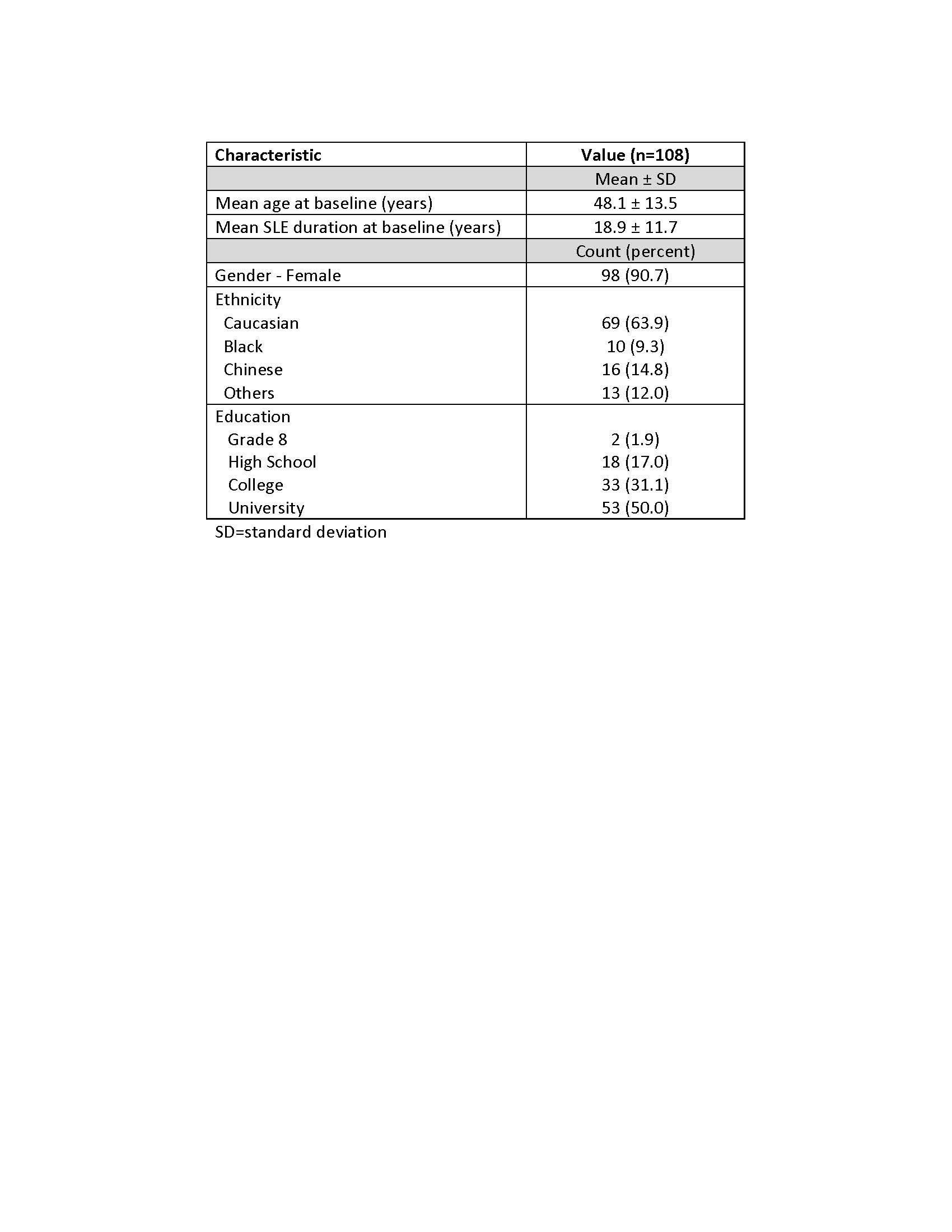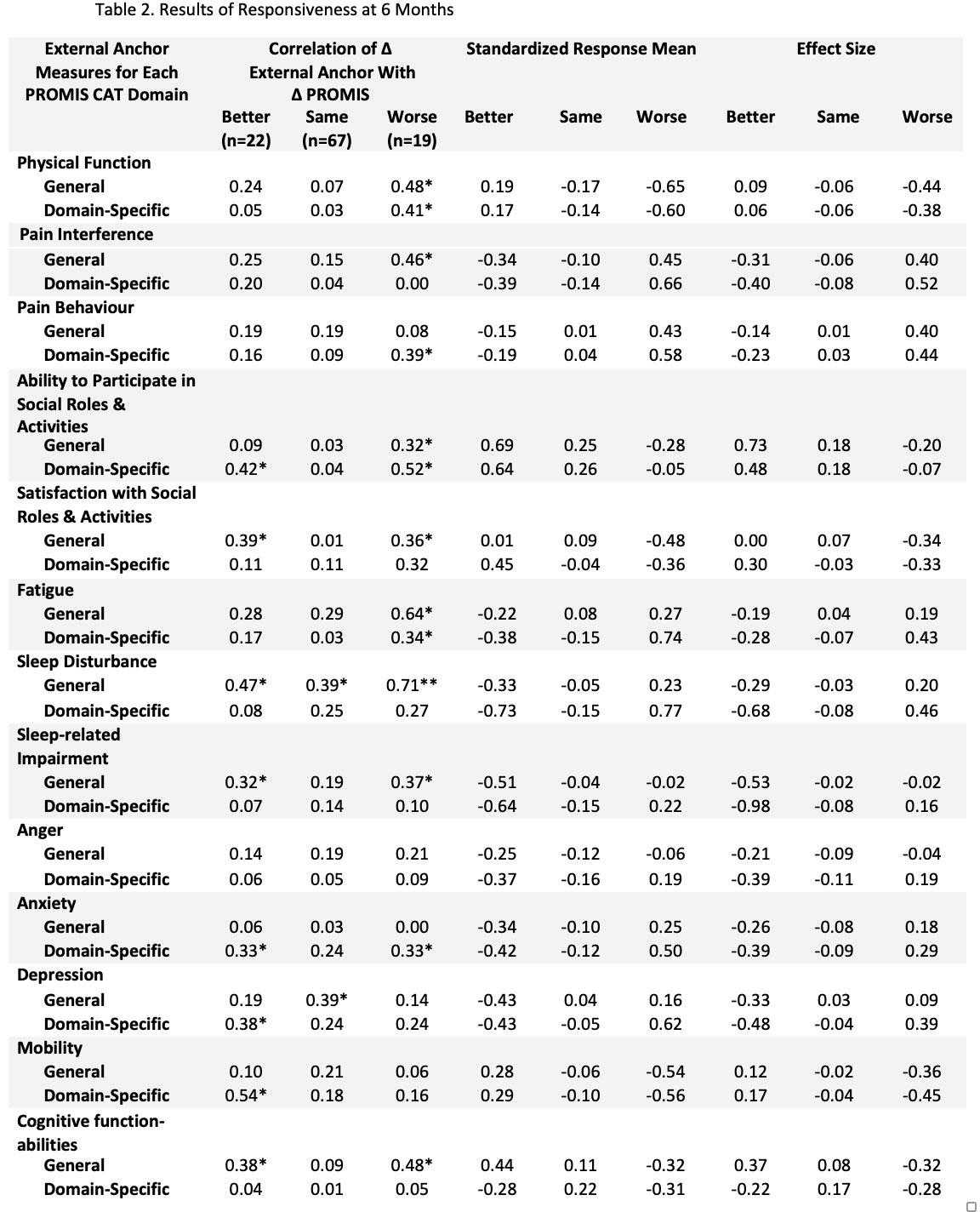Session Information
Date: Monday, November 14, 2022
Title: SLE – Diagnosis, Manifestations, and Outcomes Poster III: Outcomes
Session Type: Poster Session D
Session Time: 1:00PM-3:00PM
Background/Purpose: Clinicians should include Patient-Reported Outcome (PRO) measures in the assessment of lupus patients, as they are crucial in providing patient-centred care. The Patient Reported Outcomes Measurement Information System (PROMIS) is a relatively new set of person-centered measures that describes and evaluates physical, mental, and social health. Our previous studies have demonstrated reliability and validity evidence for the PROMIS computerized adaptive test (CAT) in patients with systemic lupus erythematosus (SLE). This study extends this evidence by examining the responsiveness of the PROMIS CAT. We hypothesized that PROMIS CAT domains will show a change when the patient reports worsening or improvement.
Methods: In this longitudinal single centre study, consecutive adult English-speaking SLE patients completed an assessment using PROMIS CAT’s 13 domains (physical function, mobility, pain behaviour, pain interference, ability to participate in social roles, satisfaction with social roles and activities, fatigue, sleep disturbance, sleep-related impairment, applied cognition-general concerns, anger, anxiety, and depression) at baseline and 6 month follow-up. We asked the generic anchor question “Compared to when you started the study, how have you been during the last 48 hours?” (same, worse, no change) at 6 months to identify those with symptom severity change. Domain-specific anchor questions aligning with the PROMIS CAT domains were also asked at 6 months with responses graded from -7 (greatest worsening) to +7 (greatest improvement); 0 represented no change. For domain-specific anchors, improvement was defined as >1, and worsening as < -1. We assessed responsiveness by examining effect size (ES) and standardized response means (SRM) in patients with improvement and worsening (ES, SRM categorized as low: 0.3-0.5; moderate: 0.5-0.8; high: >0.8). We also assessed the Spearman correlation between the change of external anchors (general and domain specific) and the change of PROMIS CAT domains between baseline and 6 months (defined as weak: < 0.3; moderate: 0.3-0.7; strong: >0.7).
Results: 108 patients were included. Baseline characteristics are in Table 1. Table 2 demonstrates correlation coefficients, SRM and ES at 6 months for both the general anchor and domain-specific questions. Correlation of change in anchor measures with change in PROMIS CAT was weak-moderate in patients with better and worse categories. SRM and ES showed small-moderate effect for patients that reported better and worse health and consistently small to no effect in patients reporting no change, indicating PROMIS CAT is measuring the domains adequately as captured by the general anchor. More moderate SRM and effect sizes were noted in the domain specific anchors compared to general. 9 out of 13 domains had moderate SRMs and ES, particularly with domain-specific anchors.
Conclusion: PROMIS CAT detected improvement and worsening over time in most domains in patients with SLE in concordance with the external anchors, supporting its responsiveness in this population for most but not all types of change.
Spearman correlation: *moderate: 0.3-0.7; **strong: >0.7
To cite this abstract in AMA style:
Thayaparan A, Katz P, Moazzami M, Bonilla D, Engel L, Su J, Akhavan P, Marzouk S, Rozenbojm N, Anderson N, Tayer-Shifman O, Beaton D, Touma Z. Responsiveness of the Patient Reported Outcomes Measurement Information System (PROMIS) Computerized Adaptive Test (CAT) Measures in a Single Canadian Lupus Cohort [abstract]. Arthritis Rheumatol. 2022; 74 (suppl 9). https://acrabstracts.org/abstract/responsiveness-of-the-patient-reported-outcomes-measurement-information-system-promis-computerized-adaptive-test-cat-measures-in-a-single-canadian-lupus-cohort/. Accessed .« Back to ACR Convergence 2022
ACR Meeting Abstracts - https://acrabstracts.org/abstract/responsiveness-of-the-patient-reported-outcomes-measurement-information-system-promis-computerized-adaptive-test-cat-measures-in-a-single-canadian-lupus-cohort/


